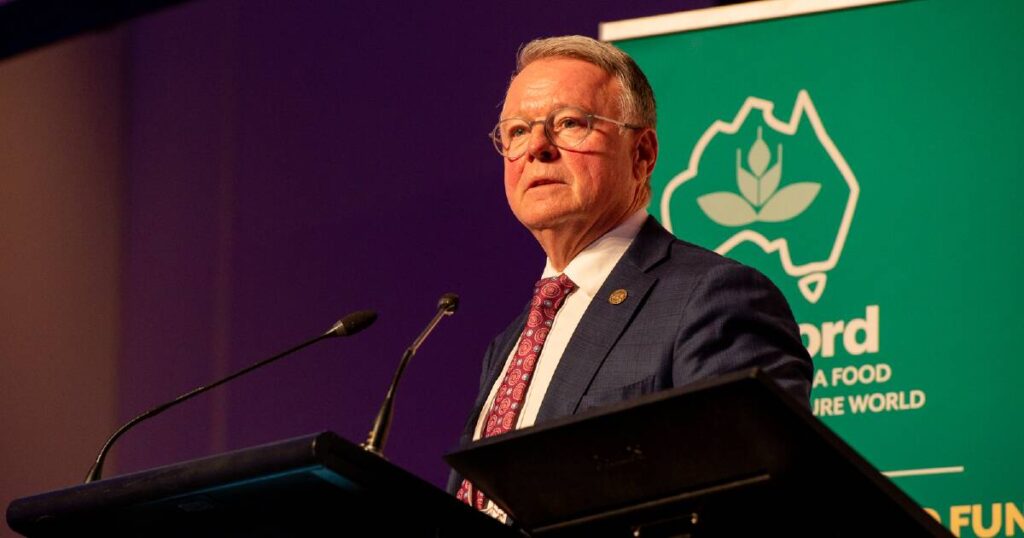
Former Australian Labor agriculture minister Joel Fitzgibbon has called for a transformative approach to climate policy, urging the Albanese government to integrate agricultural and land sector considerations into its overall strategy. In his speech at the Sir John Crawford Memorial Address held in Canberra on October 2, 2023, Fitzgibbon emphasized the need for creativity and imagination in addressing climate challenges. He believes that the current narrow focus on renewable energy is insufficient for bolstering Australia’s productivity and ensuring food security.
Fitzgibbon expressed concern that politicians often lack a deep understanding of agriculture, stating, “Too few politicians sufficiently understand it. Until there is a political controversy, it’s a policy area left to just a few.” He argued that the land sector should take precedence in the climate change agenda, as Australia could lead globally in areas such as soil health and carbon sequestration.
The former representative for Hunter highlighted a significant issue in public trust, noting that there appears to be “one set of rules for the renewable sector” and another for agriculture. He criticized the current climate framework for being rife with “greenwashing, rent-seeking, unrealistic targets, and ultra-optimistic views about emerging technologies.” To address these shortcomings, Fitzgibbon suggested that the government reconsider its stance on nuclear energy, enhance carbon capture and storage initiatives, and extend the operational life of some coal generators.
In his address, Fitzgibbon pointed to the potential for reducing methane emissions from cattle through the use of asparagopsis, a seaweed that can be fed to livestock. He also mentioned the prospects of producing biofuels and sustainable aviation fuels from non-food cover crops, which could contribute to both environmental sustainability and energy security. “The less productive areas of farm holdings can be used to plant trees for our housing and other needs,” he said, highlighting the multifaceted benefits of such initiatives.
Fitzgibbon also emphasized the urgency of adapting to changing climatic conditions, which he believes complicate the quest for food security. He remarked, “The evidence is all around us and no one understands that better than those who work the land.” The need for a robust approach to climate policy is underscored by the evolving geopolitical landscape, which demands greater sovereign capability.
The Labor Party has announced its intention to implement six sectoral decarbonisation plans, with agriculture slated to be the first rolled out by late 2024. However, Fitzgibbon noted that progress has been delayed, partly due to external factors such as Donald Trump‘s impact on international climate policy discussions. He argued that the government’s current pathway is not adequately strengthening Australia’s capacity to meet these challenges.
In response to Fitzgibbon’s remarks, Agriculture Minister Julie Collins stated that the government’s national food security strategy, known as Feeding Australia, is critical for success in her portfolio. Nonetheless, the discussion around these issues has yet to gain a permanent place within national security dialogues.
Fitzgibbon’s insights reflect a broader concern about the regulatory environment, which he believes is stifling productivity and innovation in the agriculture sector. He criticized the existing system as a “20th-century standard at best,” asserting that red and green tape are inhibiting economic growth.
Looking ahead, Fitzgibbon stressed the importance of providing certainty for investors in carbon farming and food production innovations. He believes that collaboration between food manufacturers and producers is essential for improving productivity and environmental outcomes.
As Australian policymakers prepare for discussions at Treasurer Jim Chalmers‘ upcoming economic roundtable, Fitzgibbon’s recommendations for re-evaluating the nation’s climate strategy will likely resonate. He argued that the government needs to consider the role of nuclear energy more seriously, suggesting that the current ban on uranium mining may be counterproductive given Australia’s substantial reserves.
With a focus on practical solutions, Fitzgibbon concluded that Australia does not have to compromise its economic growth to become a leader in climate action. He highlighted the importance of recalibrating the nation’s approach to include not just mitigation but also adaptation and innovation in agricultural practices.






